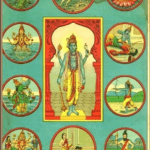The food that Hindu gods consume has been a source of contention for millennia. certain think that all gods are vegetarians, whereas others think that certain gods consume meat. There is no single definite answer because the gods’ food habits differ depending on the source.

Vegetarian Gods
Many Hindu deities are supposed to be vegetarians. Vishnu, the preserver of the cosmos, and Lakshmi, the goddess of riches and prosperity, are among them. These deities are frequently shown eating fruits, vegetables, and grains. They may also consume milk and honey in rare situations.
Meat-Eating Gods
There are, however, certain Hindu gods who are claimed to consume flesh. This includes Shiva, the universe’s destroyer, and Durga, the goddess of war. These deities are frequently represented as hunting and consuming animals. They may also consume fish and fowl in rare circumstances.
Shiva’s Diet
Shiva’s food is especially intriguing because it is reported to fluctuate depending on his mood. He may consume vegetarian meals when he is in a good mood. However, when he gets angry, he may consume flesh. Shiva is a deity of duality, representing both the destructive and constructive energies of the cosmos.
The Significance of Food
The food consumed by Hindu gods has more than one purpose. It also represents their strength and nature. Vishnu’s vegetarian diet, for example, depicts his tranquil character, whereas Shiva’s meat-eating diet represents his destructive strength.
The Importance of Vegetarianism
Vegetarianism is frequently regarded as a means of connecting with the holy in Hinduism. This is because plants are viewed as clean and harmless, and they are not damaged when consumed. Vegetarianism is also considered as a means to lessen global violence.
Here are some Hindu scripture sources that mention the food that Hindu gods eat:
- Rig Veda: The Rig Veda is one of the oldest Hindu scriptures, and it contains several references to the food that the gods eat. For example, in one hymn, the gods are said to eat soma, a sacred drink that is made from the sap of a plant.
- Mahabharata: The Mahabharata is one of the longest epics in the world, and it contains many references to the food that the gods eat. For example, in one scene, the gods are said to eat a feast that is prepared by the sage Durvasa.
- Ramayana: The Ramayana is another long epic in the Hindu tradition, and it also contains references to the food that the gods eat. For example, in one scene, the gods are said to eat a feast that is prepared by the monkey king Hanuman.
- Puranas: The Puranas are a collection of Hindu scriptures that were written over a period of centuries. They contain many references to the food that the gods eat. For example, in one Purana, the gods are said to eat a variety of fruits, vegetables, and grains.
These are just a few of the Hindu scriptures that mention the food that Hindu gods eat. It is important to note that the dietary habits of the gods vary depending on the source. However, the food that the gods eat is often seen as a symbol of their power, nature, and relationship to the world.
Here are some specific passages from Hindu scriptures that mention the food that Hindu gods eat:
- Rig Veda 9.73.5: “The gods drink soma and eat havis (oblation).”
- Mahabharata 12.191.2: “The gods ate the food that was prepared by Durvasa.”
- Ramayana 7.100.16: “The gods ate the feast that was prepared by Hanuman.”
- Bhagavata Purana 7.15.14: “The gods ate a variety of fruits, vegetables, and grains.”
These passages suggest that the gods in Hindu mythology may have eaten a variety of foods, including both vegetarian and non-vegetarian foods. However, it is important to note that the dietary habits of the gods vary depending on the source.
Conclusion
The food that Hindu gods eat is a complex and fascinating topic. There is no one definitive answer, as the dietary habits of the gods vary depending on the source. However, the food that the gods eat is a reflection of their power, nature, and relationship to the world.


Im obliged for the post.Really looking forward to read more. Really Cool.Loading…
This is a great tip especially to those fresh to the blogosphere. Simple but very precise information… Many thanks for sharing this one. A must read post.
Really appreciate you sharing this post. Want more.
Very neat article.Thanks Again. Cool.
Thanks for sharing, this is a fantastic article.Really thank you! Really Great.
I loved your blog post.Really thank you! Awesome.
wow, awesome blog article.Much thanks again. Keep writing.
wow, awesome blog article.Thanks Again. Cool.
Major thankies for the blog post.Really thank you! Awesome.
Really informative blog post.Really thank you! Really Great.
Awesome things here. I’m very satisfied to look your article.Thank you a lot and I’m having a look ahead to contact you.Will you please drop me a e-mail?
Really informative blog.Really thank you! Keep writing.